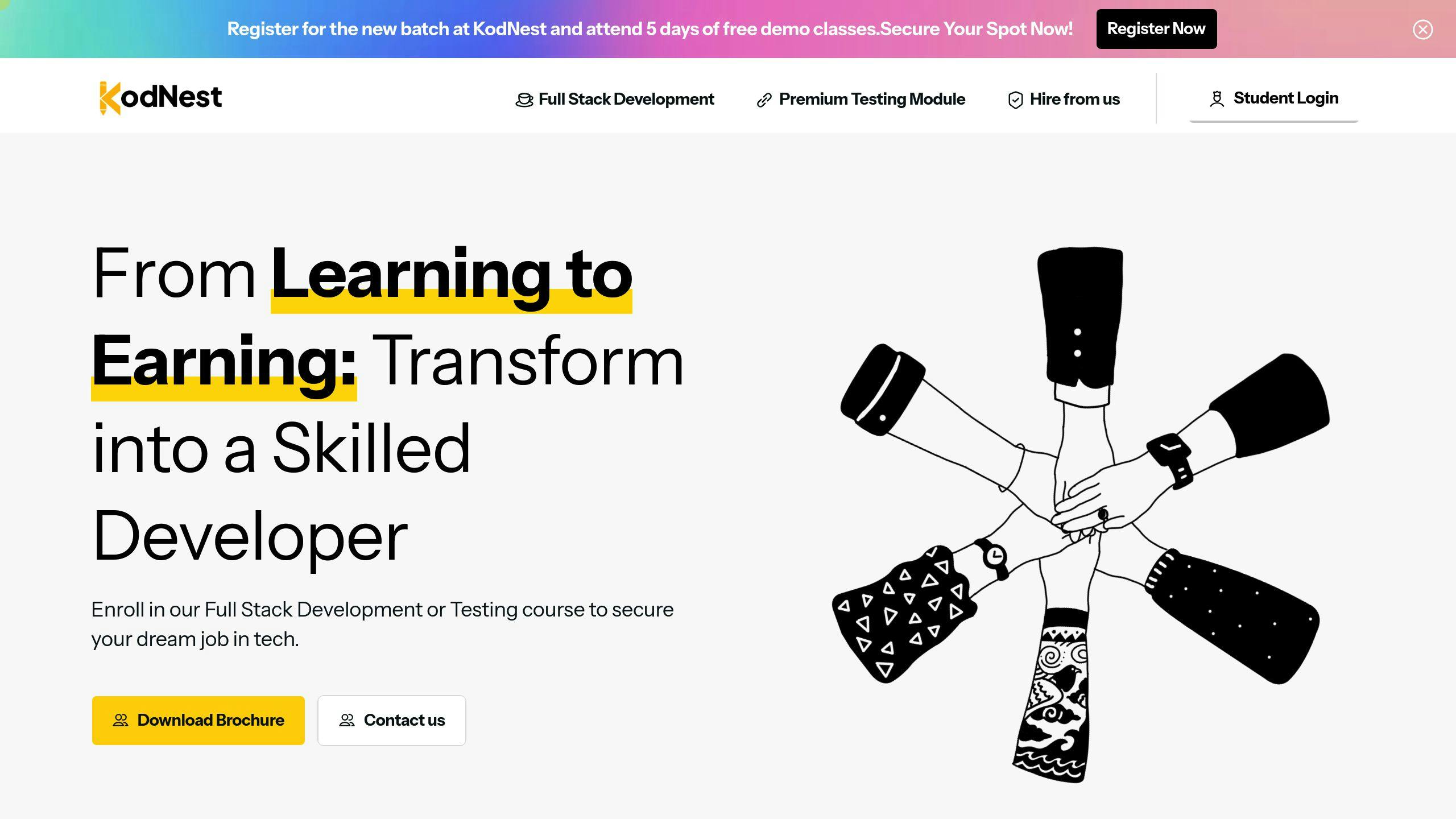Want to ace your coding interviews? Start with a clear, actionable study plan. Here’s how you can prepare effectively:
- Assess Your Skills: Identify your strengths and weaknesses in key areas like data structures, algorithms, and system design.
- Set Goals: Focus on short-term (e.g., mastering one topic weekly) and long-term goals (e.g., excelling in mock interviews).
- Prioritize Topics: Start with high-priority subjects like arrays, graphs, and dynamic programming.
- Practice Consistently: Dedicate 11 hours per week to hands-on coding, mock interviews, and problem-solving challenges.
- Use Resources: Leverage platforms like LeetCode, HackerRank, and KodNest for structured learning and mentorship.
- Track Progress: Log solved problems, analyze mock interview results, and adjust your plan regularly.
The ULTIMATE 3-month LeetCode Study Plan
1. Assess Your Current Skills and Set Goals
Taking stock of your current skills and setting clear goals helps you focus your preparation on the areas that matter most.
1.1 Evaluate Your Skills
Start by reviewing your programming knowledge. Pay close attention to three main areas:
- Data Structures & Algorithms: Focus on key topics like arrays, trees, graphs, sorting methods, recursion, and dynamic programming. These are fundamental for most interviews.
- Programming Language Proficiency: Test your skills in the specific language you’re preparing for. For example, if you’re preparing for Java-based interviews, assess your understanding of Java-specific features and implementations.
To make this process easier, create a table to track your strengths and weaknesses:
| Topic | Proficiency Level | Priority |
|---|---|---|
| Arrays & Strings | Advanced | Low |
| Binary Trees | Beginner | High |
| Dynamic Programming | Intermediate | Medium |
| System Design | Beginner | High |
Tackle high-priority areas first to make the most of your study time.
1.2 Define Specific Goals
Transform your assessment into actionable, time-bound goals. Aim for objectives that are clear and measurable.
- Short-term Goals (2-4 weeks): Focus on mastering one data structure or algorithm each week. This allows you to build confidence quickly in key areas.
- Long-term Goals (3-6 months):
- Gain a strong understanding of all core data structures and algorithms.
- Perform well in mock interviews consistently.
- Develop effective problem-solving strategies.
Plan your study time wisely. Depending on your starting point, you might need anywhere from 30 to 100 hours to prepare. Tools like KodNest can help streamline your learning with structured programs, hands-on projects, and AI-driven mentorship. These resources are great for bridging knowledge gaps and gaining practical experience in your chosen programming language.
Once you’ve evaluated your skills and set your goals, you’re ready to create a study plan that matches your priorities and schedule.
2. Create a Study Plan That Works for You
Now that your goals are set, it’s time to craft a study plan that fits your schedule and learning preferences. The goal? Build a routine that keeps you motivated while covering all the critical topics.
2.1 Focus on Key Topics
Using your skills assessment as a guide, allocate your study time based on what matters most. Prioritize the topics that are essential for interviews:
| Topic Category | Key Components | Priority Level |
|---|---|---|
| Data Structures | Arrays, Hash Tables, Trees, Graphs | High |
| Algorithms | Sorting, Searching, Dynamic Programming | High |
| System Design | Scalability, Database Design, APIs | Medium |
| Language-Specific | Core Features, Best Practices | Medium |
Start with high-priority areas like data structures and algorithms before moving on to medium-priority topics. Tools like Grind 75 can help tailor your study plan to focus on these areas effectively.
2.2 Plan Your Study Time
Aim for about 11 hours of study each week over a 3-month period to build a solid foundation. Spend most of your time on hands-on coding, with smaller portions dedicated to learning concepts and reviewing.
If you’re balancing a full-time job, try studying for 2 hours on weekdays and 3-4 hours on weekends. This schedule keeps you progressing steadily without overwhelming yourself.
2.3 Practice Mock Interviews and Challenges
Once you’re in the groove with your study routine, it’s time to test your skills through mock interviews and problem-solving challenges. These are essential for bridging the gap between theory and real-world application.
Introduce mock interviews midway through your preparation. They not only test your knowledge but also help you practice solving problems under pressure. Platforms like LeetCode and HackerRank are great for sharpening your skills with targeted challenges.
For added support, KodNest’s training programs offer hands-on projects and AI-driven mentorship. These resources can help you transition from theoretical learning to practical application seamlessly.
sbb-itb-f454395
3. Use Resources to Support Your Learning
Incorporating the right tools and materials into your study plan can make your preparation more effective and tailored to your needs. Here’s how you can make the most of structured platforms and additional resources.
3.1 Learn with Platforms Like KodNest

| Feature | What It Offers |
|---|---|
| AI-Driven Mentorship | Personalized feedback to address skill gaps |
| Mock Interviews | Simulations with professionals to build confidence |
| Hands-on Projects | Practical coding tasks to apply your knowledge |
| Career Guidance | Expert advice on navigating industry expectations |
Platforms like KodNest provide a structured way to strengthen your skills and prepare for the challenges ahead. But that’s just one part of the puzzle – let’s look at how additional resources can complement your learning.
3.2 Combine Free and Paid Resources
While platforms like KodNest give you a solid base, adding other resources can help you refine your skills and broaden your understanding.
| Resource Type | Examples | Ideal For |
|---|---|---|
| Coding Platforms | LeetCode, HackerRank, CodeWars | Daily problem-solving practice |
| Learning Materials | Grokking the Coding Interview | Understanding patterns |
| Community Forums | Stack Overflow, r/learnprogramming | Exploring alternative solutions |
| Interview Tools | interviewing.io | Practicing mock interviews |
"Combine theory, practice, and mentorship for effective preparation" [1].
To get the most out of these resources:
- Dedicate time daily to coding challenges on platforms like LeetCode.
- Tap into forums for fresh perspectives and solutions to tricky problems.
- Track your progress using tools or apps to stay motivated and focused.
4. Regularly Review and Update Your Plan
Keeping an eye on your progress and tweaking your preparation strategy can make a big difference in achieving your coding interview goals. Let’s break down how to stay on track and make adjustments effectively.
4.1 Track Your Progress
Using the right tools and methods to track your progress can help you stay organized and identify areas for improvement. Here are some ways successful candidates monitor their journey:
| Tracking Method | Purpose | Key Metrics |
|---|---|---|
| Problem Log | Keep a record of solved problems | Time taken, difficulty, solution approach |
| Performance Dashboard | Analyze improvement trends | Success rate, topic mastery, time efficiency |
| Mock Interview Results | Evaluate readiness | Clarity, speed, solution quality |
"Combine theory, practice, and mentorship for effective preparation. Regular assessment helps maintain focus and ensures comprehensive coverage of necessary topics" [1].
You can also keep things simple by using a spreadsheet to log your daily practice. Track details like:
- Problem type and difficulty
- Time spent solving
- Use of hints
- Areas needing improvement
Set aside 30 minutes each week to review your progress. This will help you spot patterns, identify weaknesses, and make informed adjustments to your study plan.
4.2 Adjust Your Plan Based on Results
As you track your performance, use the insights to fine-tune your approach. Here’s how to make adjustments based on specific indicators:
| Performance Indicator | Suggested Adjustment |
|---|---|
| Mastering easy problems | Move to harder problems and tighten time limits |
| Struggling with specific topics | Dedicate extra practice time and seek expert help |
| Slow coding despite strong theory | Focus on timed challenges to improve implementation speed |
| Mock interview feedback shows gaps | Revisit weak areas and schedule more practice sessions |
When refining your plan:
- Prioritize challenging topics from mock interviews or problem-solving sessions.
- Schedule study sessions during your most productive hours.
- Experiment with different platforms or materials if your current ones aren’t working.
Conclusion: Start Your Study Plan Today
Getting ready for coding interviews doesn’t have to be overwhelming. A well-organized plan that builds your skills step by step, paired with consistent effort, can make all the difference.
Start by focusing on the essentials:
- Core data structures and algorithms: These are the foundation of most technical interviews.
- Gradual skill building: Move from the basics to more advanced topics at a steady pace.
- Mock interviews and optimization: Regularly test yourself to refine your problem-solving and time-management skills.
- Daily practice: A little every day is far more effective than cramming.
If you’re looking for extra support, structured learning platforms can be a game-changer. KodNest, for example, combines project-based learning with AI-guided mentorship to help you tackle challenging concepts while gaining practical experience.
Here’s how to get started:
- Create a schedule: Find a routine that works for you and stick to it.
- Choose the right resources: Pick materials that align with your learning style.
- Stay consistent: Make practice a non-negotiable part of your day.
The most important step? Start now. Whether it’s setting up your first study session or picking your learning tools, taking action today brings you closer to your goal.
FAQs
How long does it take to prepare for coding interviews?
For entry-level programmers, preparation typically takes about 12 weeks, while experienced developers might need 4-8 weeks.
The time required depends on several factors, such as:
- Your current knowledge of data structures and algorithms
- The complexity of the interview process at your target company
- How much time you can dedicate daily
- Your past interview experiences
Preparation isn’t just about time – having a clear and structured approach is just as important.
How to prepare for coding interviews in 2024?
Coding interviews in 2024 require a mix of technical expertise and strong communication skills. Here’s a breakdown of key focus areas:
| Area | Key Topics | Suggested Resources |
|---|---|---|
| System Design | Architecture, scalability | Alex Xu’s System Design books (Volumes 1 & 2) |
| Technical Skills | Data structures, algorithms | Grokking the Coding Interview, LeetCode |
| CS Fundamentals | Operating systems, databases | Standard textbooks, online courses |
| Behavioral | Leadership, problem-solving | Mock interviews, company-specific materials |
Plan your daily schedule around specific topics, and include time for consistent reviews. Use a mix of coding platforms, books, and mock interviews to cover all areas. Mock interviews, in particular, are excellent for practicing behavioral questions, helping you clearly explain your experiences and thought processes.
This structured approach ensures you develop both the technical knowledge and the skills needed to handle even the toughest interviews with confidence.





